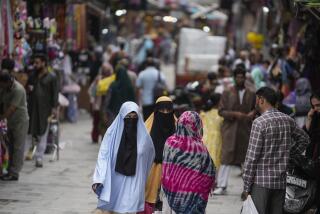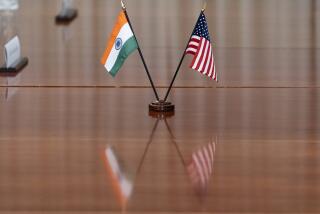As Kashmir Boils, Keep Heat on Pakistan
- Share via
Until last week, the American diplomatic effort to head off a war between India and Pakistan had focused sharply on stopping Pakistani-sponsored Islamic extremist incursions into Indian-controlled areas of Kashmir. Now, after his visit to India and Pakistan, Secretary of State Colin L. Powell has relaxed his pressure on Islamabad, ignoring continued Pakistani sponsorship of these incursions and efforts to disrupt the key October elections in the Indian-ruled part of Kashmir.
This abrupt tilt toward Islamabad has provoked Indian distrust of U.S. bona fides that will make it difficult for Washington to continue acting as a de facto mediator between the two nuclear-armed South Asian rivals.
Powell declared that India should permit an “international presence” to observe the October balloting, “to show the world that it is a free, open, fair election.”
This was good advice, but Powell failed to couple it with an appeal to Pakistani intelligence agencies to stop their systematic assassinations of Kashmiri insurgents who advocate participation in the elections, like the respected moderate Abdul Ghani Lone, who was murdered May 21.
Seven leaders of the National Conference party that governs in the Indian portion of Kashmir have also been killed during the last month.
The new American tilt toward Islamabad was also reflected in the fact that Powell pointedly avoided calling on Pakistan to dismantle the training camps and communications facilities on its side of the Kashmir cease-fire line. So long as this infrastructure remains in place, Pakistan can adjust the level of infiltration at will, preventing the return to normalcy that is necessary for meaningful elections.
Evidence increasingly points to Pakistani fingerprints in Lone’s murder. Lone had signaled his intention to run in the Kashmir state assembly election. The director of Pakistan’s Inter-Services Intelligence Agency, Lt. Gen. Ehsan Ul-Haq, presided over a strategy meeting held in Sharjah, United Arab Emirates, in April with seven key Kashmiri insurgent leaders who had received Pakistani aid, including Lone.
Ehsan denounced Lone for supporting participation in the elections and warned him to stop, according to accounts in Sharjah Arabic-language newspapers and the Pakistani press that were confirmed to me by a Pakistani diplomat.
After the meeting, Lone went to the United States for medical treatment, returning to Kashmir on May 19. On May 20, at a meeting of Pakistani-backed insurgent groups, he urged participation in the elections. The next day, he was assassinated.
Unless the U.S. is able to restrain Pakistan, the next targets could well be Mirwaiz Omar Farooq, the principal Muslim religious leader in the Indian-controlled Kashmir Valley, who supported Lone in the Sharjah meeting; and Shabir Shah, another widely respected moderate, who met with a top Indian official recently to explore a compromise with India concerning the election and autonomy for Kashmir.
The United States should urge Pakistan to support the elections as the first step toward a dialogue between India and Pakistan on Kashmir. Before beneficial discussions can take place, New Delhi will have to negotiate on autonomy with a new, more representative government in the Indian-ruled portion.
If India and the Kashmiris under its control could reach an accommodation on autonomy, the stage would be set for a dialogue between Islamabad and the Kashmiris in Pakistani-controlled Azad (Free) Kashmir for a comparable degree of autonomy.
India and Pakistan could then discuss recognition of the cease-fire line as a permanent international boundary; interchange between the two parts of Kashmir; a pullback of the forces of both sides; and a reduction of the Indian and Pakistani forces stationed in both parts of the state.
Little attention is paid to the fact that the Kashmiris under Pakistani control are also seeking autonomy. On July 26, the Pakistan Daily Times reported that Altaf Qadiri, a key leader of the All Party Hurriyat Conference, a Pakistani-sponsored insurgent coalition, called the Azad Kashmir regime “worse than the government on the Indian side.”
The October elections mark a critical turning point in the search for peace in Kashmir, and only an evenhanded U.S. policy can help promote broad-based participation by the Kashmiri people. New Delhi should be urged to make the elections fair and to permit some form of international monitoring. But India’s best efforts will not bring stability to the state unless the U.S. can get Pakistan to keep its hands off.
More to Read
Sign up for Essential California
The most important California stories and recommendations in your inbox every morning.
You may occasionally receive promotional content from the Los Angeles Times.










